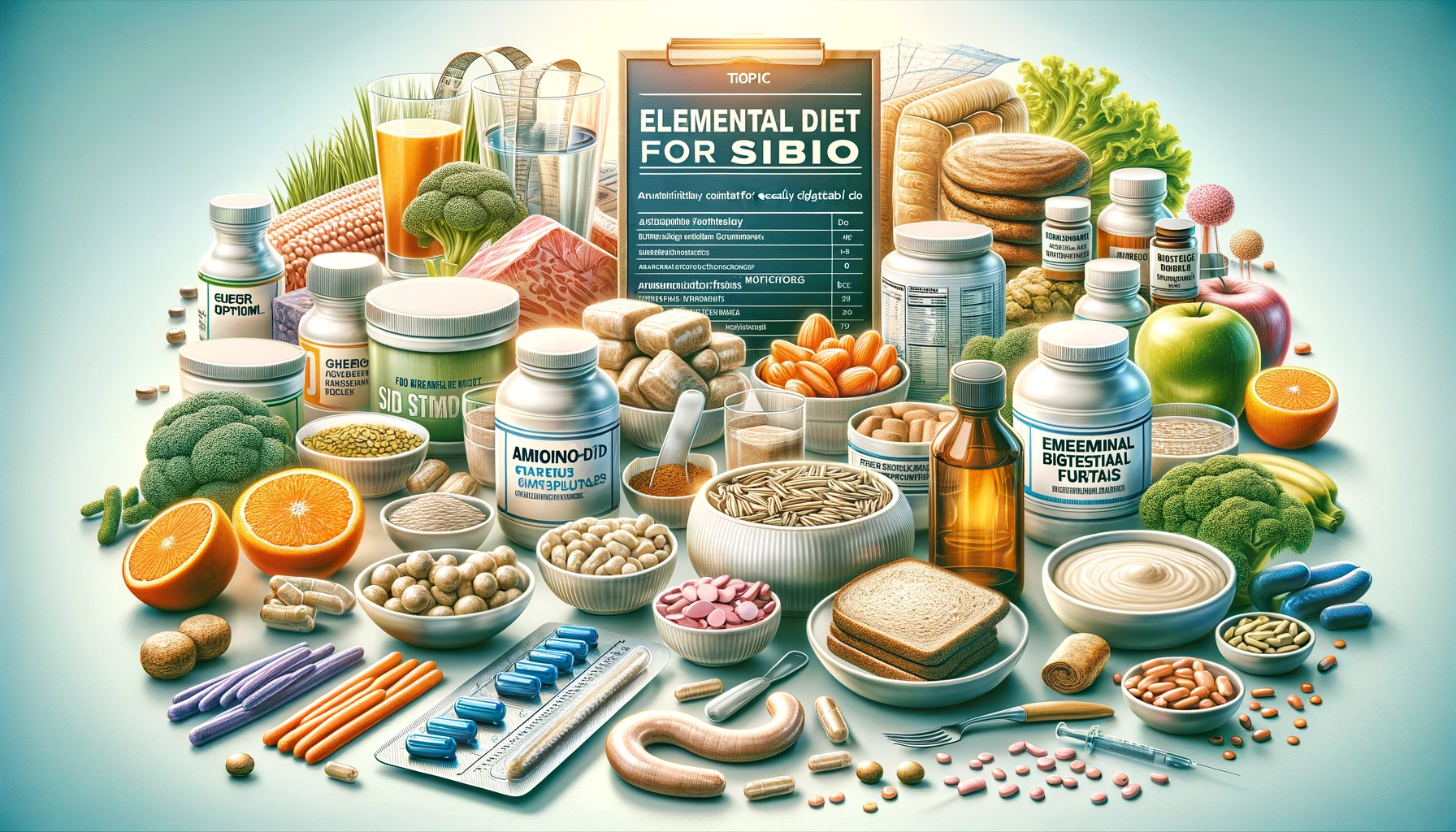Elemental Diet SIBO
What is SIBO?
Small Intestinal Bacterial Overgrowth (SIBO) is a digestive disorder characterized by an abnormal increase in bacteria in the small intestine. Unlike the large intestine, which houses many bacteria, the small intestine is supposed to have comparatively fewer due to its critical role in nutrient absorption. SIBO disrupts this delicate balance, leading to various gastrointestinal symptoms and nutrient malabsorption issues.
Causes and Symptoms of SIBO
SIBO can be triggered by several factors, including slow gut motility, structural abnormalities, certain medications, and diseases that affect the intestines’ functionality. Common symptoms include bloating, gas, abdominal pain, diarrhoea, and sometimes weight loss and malnutrition, reflecting the impaired absorption of nutrients.
- Causes of SIBO:
- Slow gut motility
- Structural abnormalities in the intestines
- Use of certain medications
- Diseases affecting intestinal functionality
- Symptoms of SIBO:
- Bloating and gas
- Abdominal pain
- Diarrhea
- Weight loss and malnutrition
Importance of Diet in Managing SIBO
Diet plays a crucial role in managing SIBO. Certain foods can exacerbate symptoms by feeding the overgrown bacteria, leading to increased gas and discomfort. Modifying one’s diet to limit the intake of such foods can help manage symptoms and, in some cases, reduce bacterial overgrowth. A tailored dietary approach, often combined with other treatments, is essential for effectively managing SIBO.
Understanding the Elemental Diet SIBO
What is an Elemental Diet?
An Elemental diet for SIBO is a nutritionally complete diet that provides all the essential nutrients in their most basic form. This diet consists of easily digestible, pre-digested nutrients that require minimal digestive effort to be absorbed. It’s typically delivered in liquid form and is used in medical settings to manage various gastrointestinal diseases, including SIBO.
Components of an Elemental Diet
The key components of an Elemental Diet include:
- Proteins: Proteins are provided in the form of free AA, which are the building blocks of proteins. They require no digestion and are directly absorbed into the bloodstream.
- Carbohydrates: Carbohydrates are usually provided as simple sugars like dextrose or glucose, easily absorbed with minimal digestive effort.
- Fats: Supplied in the form of medium-chain triglycerides (MCTs), which are more easily absorbed than long-chain triglycerides found in typical diets.
- Vitamins and Minerals: Essential vitamins and minerals are added in their simplest forms to ensure nutritional completeness and support overall health.
How the Elemental Diet Works for SIBO
The Elemental Diet works by minimizing the amount of undigested food that can ferment in the gut, thereby reducing the primary food source for the bacteria causing SIBO. Since the nutrients in the Elemental Diet are in their simplest forms, they can be absorbed in the upper part of the small intestine. This limits the nutrients available to the bacteria in the lower parts, decreasing bacterial overgrowth. Additionally, the diet allows the gut to rest and heal, reducing inflammation and improving symptoms of SIBO.
Implementing the elemental formula Diet
Embarking on the Elemental Diet is a significant step towards managing Small Intestinal Bacterial Overgrowth (SIBO) and restoring gut health. While challenging, this journey can substantially improve gastrointestinal symptoms and overall well-being. Below, we detail the preparation, guidelines, duration, and what to expect, including challenges and tips, for those considering or starting the Elemental Diet.
Preparation for the Elemental Diet
- Consult a Healthcare Professional: It is crucial to work with a healthcare provider to tailor the elemental diet to your specific needs and ensure its safety.
- Understanding the Diet: The elemental diet consists of pre-digested nutrients in liquid form, including amino acids, fats, sugars, vitamins, and minerals, designed to be easily absorbed.
- Procurement of Elementals Formula: Obtain a high-quality elementals formula recommended by your healthcare provider. Commercial formulas are available specifically designed for this purpose.
- Planning: Calculate the formula you’ll need and any lifestyle adjustments required during the diet’s duration.
Guidelines and Duration
Strict Adherence: The effectiveness of the Elemental Diet for SIBO depends on strict adherence to consuming only the elemental formal, as it’s designed to minimize the nutrients available to pathogenic bacteria in the small intestine.
Duration: The typical duration for the Elemental Diet is between 2 to 4 weeks. The exact length can vary based on individual responses and healthcare provider recommendations. Some may see significant improvements within two weeks, while others might need to extend the diet’s duration for optimal results.
Monitoring and Adjustments: Regular monitoring by a healthcare professional is essential to ensure nutritional needs are met and to adjust the diet as necessary based on response and tolerance.
What to Expect: Challenges and Tips
Challenges:
- Taste Fatigue: Some individuals may find the taste of the elemental formal monotonous over time. Experimenting with allowed flavour enhancers or serving the formula chilled can help improve palatability.
- Social Situations: Navigating social events or dining out can be difficult when on a strict liquid diet. Preparing explanations for friends and family about your dietary restrictions can help ease these situations.
- Hunger and Cravings: Initially, you may experience hunger or cravings for solid food. These feelings usually diminish as your body adjusts to the diet.
Tips for Success:
- Stay Hydrated: Drink plenty of water throughout the day to help manage hunger and maintain hydration.
- Create a Routine: Establishing a routine for consuming your elemental formal can help integrate the diet into your daily life more smoothly.
- Seek Support: Engaging with online forums, support groups, or counselling can provide encouragement and tips from others who have navigated the Elemental Diet.
- Focus on the Goal: Remember the diet’s purpose and potential health benefits. Keeping a journal to track your symptoms and improvements can be motivating.

Benefits and Considerations of SIBO and the Elemental Diet
Scientific Evidence Supporting the Elemental Diet for SIBO
Research indicates that the 14-day elemental diet is highly effective in reducing bacterial overgrowth in the small intestine, with success rates reported as high as 80-85% in some studies. This diet provides nutrition in forms requiring minimal digestion, thereby starving the excess bacteria in the small intestine without starving the person.
Potential Benefits
- Rapid Symptom Relief: Many patients report significant improvement in symptoms such as bloating, abdominal pain, and diarrhoea.
- Nutritional Support: The diet ensures that patients receive all essential nutrients in a digestible form, which can help address malnutrition issues associated with SIBO.
- Alternative to Antibiotics: The elemental diet offers an effective alternative treatment for individuals unable or unwilling to use it.
Risks and Considerations
- Cost: Elemental formals can be expensive, and not all insurance plans can cover the cost.
- Social and Emotional Impact: The diet can be socially isolating and emotionally challenging due to the strict restrictions on food intake.
- Reintroduction Phase: After completing the elemental diet, reintroducing foods must be done carefully to prevent a recurrence of symptoms. A structured plan developed with a healthcare professional is essential for maintaining long-term health.
Alternative Therapies and Diets for SIBO
Low FODMAP Diet
The Low FODMAP Diet is designed to reduce the intake of fermentable oligo-, di-, mono-saccharides, polyols, and short-chain carbohydrates poorly absorbed in the small intestine and highly fermentable. By limiting these foods, the diet aims to decrease the amount of fermentable substrates available to intestinal bacteria, thus reducing gas production, bloating, and other SIBO-related symptoms.
Key components:
- Phase 1: Strictly eliminating high FODMAP foods for 4-6 weeks.
- Phase 2: Gradual reintroduction of specific foods to identify triggers.
- Phase 3: Personalization of diet to maintain a balanced intake of nutrients while avoiding symptom triggers.
Antibiotics and Herbal Therapies
It is commonly prescribed to reduce bacterial overgrowth in SIBO. The antibiotic choice, treatment duration, and need for repeat cycles can vary based on individual responses and the specific bacterial profile.
Herbal therapies offer an alternative for those seeking non-pharmaceutical options. Herbs such as oregano oil, berberine, and garlic have natural antimicrobial properties that can help reduce bacterial overgrowth. These treatments are appealing for their perceived lower risk of side effects and antibiotic resistance, though more research is needed to understand their efficacy fully.
Lifestyle Modifications
Lifestyle changes play a critical role in managing SIBO. These may include:
- Eating habits: Smaller, more frequent meals can ease digestion.
- Stress management: Techniques like yoga, meditation, and therapy can reduce stress-related normal gastrointestinal symptoms.
- Physical activity: Regular exercise can improve gut motility and overall well-being.
Clinical studies and inflammatory bowel disease (IBD)
Inflammatory Bowel Disease is a complex condition that has been the focus of numerous clinical studies worldwide. Here are four points about clinical studies and inflammatory bowel disease:
- Clinical studies in inflammatory bowel disease focus on understanding the causes, developing effective treatments, and improving patients’ quality of life.
- Research often investigates the role of genetics, the immune system, and environmental factors in developing inflammatory bowel disease (IBS).
- Recent trials have explored new medications, such as biologics and small molecules, targeting specific inflammation pathways.
- Studies also assess the impact of diet, lifestyle changes, and psychological support on managing normalized inflammatory irritable bowel disease symptoms and flare-ups.
Success Stories and Case Studies
Personal Experiences
The power of personal stories in the battle against SIBO cannot be understated. For instance, Jane, a 34-year-old with chronic bloating and pain, found relief through a combination of the Low FODMAP Diet and targeted herbal therapies. After years of discomfort, her symptoms significantly decreased, allowing her to return to her favourite activities without fear of flare-ups.
Clinical Case Studies
Clinical research offers valuable insights into the effectiveness of various SIBO treatments. A notable case study involved a patient with long-standing SIBO symptoms unresponsive to traditional treatments. The introduction of a strict Low FODMAP diet, coupled with a carefully selected antibiotic regimen, resulted in a dramatic improvement in symptoms and quality of life. This case highlights the importance of personalized treatment plans and the potential for combination therapies to address complex cases of SIBO. Also visit my other post, How Vega Protein Supports Your Health Goals.

1 thought on “Elemental diet for SIBO | Causes and Symptoms of SIBO”